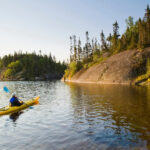A fast-moving wildfire erupted in White Rock, British Columbia Thursday afternoon, prompting authorities to issue an immediate shelter-in-place order for residents in the area. The blaze, which began near the city’s southern border, quickly intensified amid unseasonably dry conditions and gusty winds.
“This is an extremely dynamic situation,” said Fire Chief Sandra Mitchell during an emergency press briefing. “We’re asking all residents within the affected zones to remain indoors with windows closed and ventilation systems off until further notice.”
The wildfire, first reported around 2:30 p.m., has already consumed approximately 15 hectares of brush and woodland at the urban-forest interface. Provincial wildfire services have deployed multiple air tankers and helicopters to support ground crews battling the flames that threaten several residential neighborhoods along the city’s southern edge.
Local authorities activated the emergency operations center within minutes of the fire’s detection. “Our priority is protecting lives and critical infrastructure,” explained Mayor Robert Manning. “We’ve established evacuation routes should conditions deteriorate, but for now, remaining sheltered is the safest option for residents.”
Climate scientists note that the 2024 fire season has begun unusually early in coastal British Columbia. Dr. Elaine Prescott, climatologist at the University of British Columbia, told CO24 News that “the precipitation deficit we’ve experienced since February, combined with higher-than-average temperatures, has created perfect conditions for wildfire activity in areas that typically wouldn’t see such threats until much later in the summer.”
The BC Wildfire Service has classified the White Rock incident as a “wildfire of note,” indicating its potential to threaten public safety or infrastructure. Resources from neighboring Surrey and Delta have been mobilized as part of a coordinated regional response.
For White Rock residents, this emergency hits particularly hard as the community rarely faces wildfire threats of this magnitude. “I’ve lived here for 30 years and never seen anything like this,” said resident Michael Chen, who watched from his apartment as water bombers made drops near his neighborhood. “The speed at which this developed is terrifying.”
Health officials are also warning about air quality concerns, particularly for vulnerable populations. “Even if you’re not in the immediate vicinity of the fire, smoke can travel significant distances and cause respiratory distress,” cautioned Dr. Sarah Winters of Fraser Health. “Those with pre-existing conditions should take extra precautions.”
Provincial authorities have established an emergency hotline (1-800-663-5555) for residents seeking information or reporting new fire activity. Updates are being posted hourly on the BC Wildfire Service website and through emergency alert systems.
As night falls on White Rock, emergency crews continue their battle against a blaze that serves as a stark reminder of British Columbia’s changing climate reality. With fire seasons growing longer and more intense each year, one must wonder: are coastal communities like White Rock adequately prepared for what appears to be the new normal of wildfire risk in regions previously considered low-threat?

























